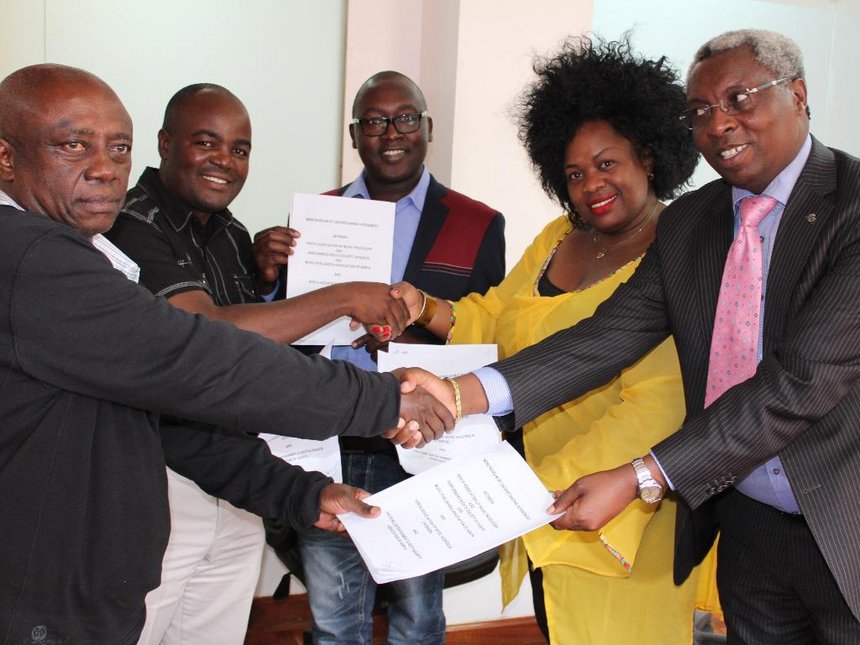
The Copyright Act of 2001 is an Act of Parliament to make provision for copyright in literary, musical and artistic works, audio-visual works, sound recordings, broadcasts. The Act also establishes Kenya Copyright Board (KECOBO), a state corporation under the Office of the Attorney General and Department of Justice (AG). Principally the Act empowers KECOBO to license and supervise the activities of collecting societies, also known as Collective Management Organisations (CMOs). Anybody who wants to use music (subject to copyright) in public needs a licence to do so. The licence fee, or royalty, depends on the type of use. Royalty rates are set in tariffs, which are determined by CMOs.
The Pubs and Restaurants Association of Kenya (PERAK), the Kenya Association of Hotel Keepers and Caterers (KAHC) among other public performance or communication to the public rights licensees have actively engaged both the CMOs and KECOBO regarding tariff setting and licensing conditions. Their key message: the setting and approval of the tariffs for bars, restaurants and hotels must be consultative and cater for the interests of all parties involved. The Statute Law Miscellaneous Amendments Act 2014 introduced section 46A of the Copyright Act Cap 130 Laws of Kenya which has the following three main effects:
- It creates a mandatory requirement of approval and gazettement for all tariffs set by CMOs to license copyright users.
- It prohibits any registered CMOs from imposing or collecting royalty based on tariffs that have not been approved and published in the Government Gazette from time to time by the Honorable Attorney General.
- It empowers the Honorable Attorney General to exempt any user of copyright works from paying royalties by notice in the Gazette.
All the effects contained above are subject to Article 47 of the Constitution of Kenya 2010 which provides for fair administrative action. It states that every person has the right to administrative action that is expeditious, efficient, lawful, reasonable and procedurally fair. As a result, PERAK and KAHC argued that any decision made to approve or gazette the tariffs of the CMOs is clearly an administrative action and therefore it must conform to the requirements of this Article. Furthermore, Article 46 of the Constitution provides that consumers have the right to the protection of their economic interests.
In light of the above, PERAK and KAHC opposed the 2016 CMO tariffs. They argued that the tariffs were grossly inflated and exorbitant compared with similar tariffs of other CMOs in both developing and developed countries around the world.
Is this argument plausible?
Available data suggests that the tariffs for copyrights in the musical works in Kenya are five times higher than in other foreign jurisdictions comparable to Kenya. In arriving at this conclusion, we considered the tariffs provided by the South African Copyright Review Commission in its report to the Minister for Trade and Industry which compared the tariffs of SAMRO (the MCSK counterpart in South Africa) with several CMOs including IPRS (the MCSK counterpart in India) and PRS (the MCSK counterpart in the United Kingdom). For background music in a space of 2,000 square metres , MCSK’s proposed tariff for 2016 amounts to a staggering Kshs 86,111.28 whereas the tariffs for the various MCSK counterparts around the world range from Kshs 15,834 (SAMRO) to Kshs 61,523 (PRS).
Similarly, available data suggests that the tariffs for related rights in sound recordings are over six times higher than other foreign jurisdictions comparable to Kenya. In arriving at this conclusion, we considered tariffs from Malaysia, Australia, South Africa and the United Kingdom. For instance, PRiSK proposed tariff for 2016 is more than double the license fee charged by RPM (the PRiSK counterpart in Malaysia). As a result, 2,000 square feet under the PRiSK tariff will cost a single user no less than Kshs 18,000 under tariff 22 whereas for the same area, users in Malaysia pay RPM about Kshs 7,937.28.